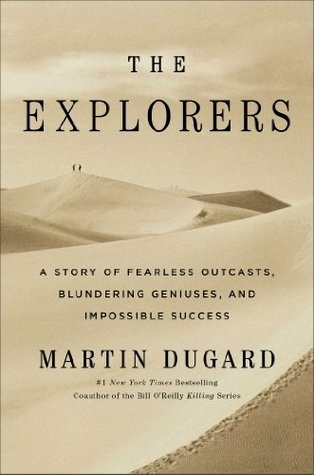Usually I don't like to be snarky in a review, but this book deserves it by not just being dumb, but spectacularly, impressively dumb. In the interest of being (slightly) fair, I should admit that I'm probably not the intended audience—the book's meant to be (I guess?) a self-help book that's for some reason burdened with historical anecdotes about explorers, and I only read it because I won an advanced review copy and didn't realize until too late that it was not simply a history of Richard Burton and John Speke, as the misleading summary implied.
As a favor to you, whose time is precious, here's the whole book in one sentence, so you don't have to read it (you shouldn't): curiosity, hope, passion, courage, independence, self-discipline, and perseverance are important, and because explorers have all of these qualities, so should you.
As I said, the book is dumb. The organization makes little sense: the book is separated into sections according to the seven virtues the author believes every explorer possessed, virtues which I suppose he must have decided on through the carefully analytic and scientific process of guessing what might sell well. This organization might work, I suppose, for a self-help book, but here it is arbitrary, as his main thesis is that a person must encompass all these qualities at the same time, and thus should be self-evident to some degree in each anecdote. Why not just number the chapters? Or arrange them chronologically (as they basically are anyway)? The only concession to this organization are brief, vague, and trite meditations on the virtue that show about the same depth of thought as a undergraduate freshman puts into a paper that's due the next day: "And while curiosity peaks in childhood, when the entire world is new, a lifelong habit of curiosity is empowering." Thanks, Dugard.
The author also has the terrible habit of trying to morally frame whatever he says. He's forgotten that most basic tenet of writing—show not tell. Here's a sentence from the prologue about Richard Burton, whom we haven't even met yet: "The fancy words and well-crafted arguments of a hedonist intellectual like Richard Francis Burton have no place [in the hunt]." These aren't Speke's thoughts, like in a novel, but the author's, who fails to grasp the irony of calling Burton a hedonist, in contrast to Speke, just in the middle describing the latter blasting small birds out of the sky for the hell of it. He also can't let a sentence stand on its own; when someone runs a spear through Burton's face and the brave explorer runs down the beach, Dugard tells us flatly, "The fact that Burton managed to run down the beach with a very long spear sticking out both sides of his head is remarkable." It sure is. That's why you don't need to tell us.
In fact, the author really seems to have it out for Sir Burton. He starts calling him (I'm not kidding) Dick Burton, akin to referring to Shakespeare as Bill. Later, when Burton gets that SPEAR TO THE FACE and is grievously wounded, Dugard can't help but tell us that our hedonist also has syphilis to boot. The author takes pains to point out multiple times that the honorable Speke never touched women (even at home!), without ever grasping that the explorer might simply not like them (Dugard didn't learn his own lesson of curiosity enough to think this through).
I think you get the idea. But one last thing I can't resist pointing out are the footnotes which fluctuate between being interesting, irrelevant, and, most fun, truly mystifying, such as informing us that a sentence about explorers being outcasts is actually a paraphrase of Bruce Springsteen speaking about rock stars ("Given that explorers have frequently been labeled as the rock stars of their time, the comparison is apt," the author asserts with his usual authority, leaving us to wonder what he's been reading and if we should tell him that the idiom does not refer to literal rock stars). I mention these footnotes only because I happen to own a copy of Burton's Arabian Nights translation, and his footnotes are almost as entertaining as the stories themselves. Dugard could've learned something else from the explorer.
In short, if you want a self-help book, look elsewhere. If you want a book on explorers, surely there are better ones. If you hate Richard Burton, then this is for you.

